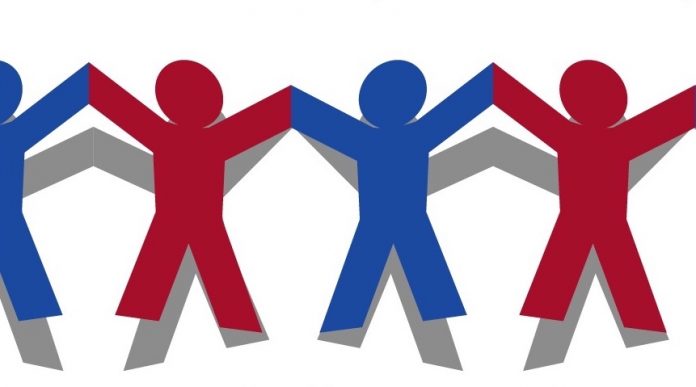If LGBTQ people aren’t counted in the 2020 US Census, then we just don’t count when it comes to vital public support.
That’s the message public health experts at the Boston-based Fenway Institute are sending us today — in this last week of their drive to get out the LGBTQ Census responses. And here’s why:
“The information collected in the Census is used to determine political representation by revising local precinct maps and Congressional districts based on changes in population,” say the folks at Fenway. “The Census also determines the amount of federal funding a state will receive for education, transportation, health care, housing, and social services.”
And here’s some answers from the Fenway Institute’s Sean Cahill, director of health policy research, and Tim Wang, senior policy analyst, to more specific questions important to LGBTQ individuals:
Q: I remember reading that LGBT people are no longer included in the Census. Is that true?
A: No. This year, for the first time, cohabiting same-sex couples can identify as either same-sex married spouses or same-sex unmarried partners. The Census will not ask questions about sexual orientation or gender identity. Although more than 25 federal surveys that survey individuals now ask about sexual orientation, gender identity, and/or allow cohabiting same-sex couples to self-identify, the decennial Census does not. When filling out the Census, one person in a household fills out the form on behalf of all of the residents in the household. Reporting the sexual orientation and/or gender identity of other people is much more complicated methodologically than reporting your own sexual orientation and/or gender identity. Advocates are working with the Census Bureau to test questions and methods of collecting data about sexual orientation and gender identify for future iterations of the Census.
Q: I identify as transgender or nonbinary. Will I be able to make that clear on the Census form?
A: Unfortunately, the 2020 Census uses a binary sex question that does not allow for some people, especially nonbinary people, to report their gender accurately. Advocates are currently working to get a better set of gender questions and options on the Census and other surveys in the future. For the 2020 Census, however, people should respond to the binary sex question in the way that feels best given the limited response options. It is important to note that the Census Bureau will not cross-reference the information you provide against other documents, such as drivers licenses or birth certificates, so you are free to self-identify your gender as best as you can. Some nonbinary people may decide that not responding to the sex question is what would feel best for them. In this case, it is worth noting that leaving questions blank increases the likelihood that the Census Bureau will send workers to follow-up in person to complete the missing responses. Additionally, statisticians may “impute,” or make educated guesses, to fill in missing data during the analysis of Census surveys. We would strongly caution against boycotting the Census altogether. A fully completed Census form will provide our communities with the most accurate political representation and access to vital resources.
Q: Why should we tell a hostile federal administration that we are a cohabiting same-sex couple?
A: This is a good question. It’s important to note that the Trump Administration does not represent the federal government as a whole. While many high-profile Trump appointees oppose legal equality for LGBT people, and many promote anti-LGBT prejudice and stigma, career civil servants in the U.S. Census Bureau want LGBT people to participate in the Census, and want cohabiting same-sex couples to self-identify on the Census form in order to create an accurate picture of our community. The Census Bureau is forbidden from sharing identifying information collected in the Census with anyone outside the Census Bureau for 72 years. This means that identifying data from the 2020 Census cannot be publicly shared until 2092. Identifying data cannot even be shared with other government agencies. Confidentiality is of utmost importance to the Census Bureau, and personal data will not be used against those who provide it.
Since 1990 the U.S. Census has been allowing same-sex cohabiting couples to self-identify. This data set tells us that LGBT people live in 99.9% of U.S. counties, and also tells us important demographic information about LGBT families. We know that female same-sex couples (lesbian or bisexual female couples) are more likely to have children, earn less, and are more likely to rent than own their homes. This is also true of male and female same-sex couples in which at least one spouse or partner is Black or Latinx. This is important information for public policy makers to know. It tells us that anti-LGBT family policies, which continue to proliferate at the state and federal level despite marriage equality, hurt all LGBT people, but disproportionately harm lesbian and bisexual women and people of color who are LGBT. Equitable family recognition policies for LGBT people is a women’s rights issue and a racial/ethnic justice issue, as well as an LGBT equality issue.
Q: What difference does it make whether I complete the U.S. Census form?
A: The Census count determines how much federal funding Massachusetts, Rhode Island, New Hampshire, and other states get for social services, including health care, Medicaid and Medicare, education, food stamps, housing assistance, and other programs that are more important than ever for struggling families trying to survive in the expensive communities in which we live. The Census also determines how many Congressional House seats each state is allotted. Congressional House districts will be redrawn in 2022 based on the results of the 2020 Census. Full participation in the Census among all residents of Massachusetts, including immigrants and LGBTQIA+ people, is essential if Massachusetts is to retain nine House seats. LGBT people live everywhere, but we tend to concentrate in urban areas and in certain states, according to Gallup Poll data and Census same-sex couple household data. Congressional Representatives from these areas tend to support legal equality for LGBT people. If we don’t participate in the Census, and as a result, more House seats shift to more conservative parts of the country, it will be even harder to pass pro-LGBT legislation through Congress or elect a pro-LGBT President through the Electoral College than it already is.
Not a subscriber? Sign up today for a free subscription to Boston Spirit magazine, New England’s premier LGBT magazine. We will send you a copy of Boston Spirit 6 times per year and we never sell/rent our subscriber information. Click HERE to sign up!









